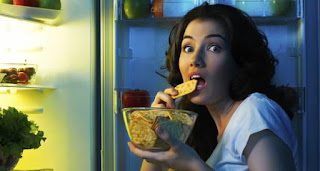*Hormones may drive urge to eat at night*.
EVENING HUNGER ''may have been an evolutionary adaption that helped us get through the night,'' said Dr. Satchidananda Panda, a professor at the Salk Institute for Biological Studies in San Diego.
''For millions of years, our night time period was a time when we didn't have access to food, and you also could not just get yourself food as soon as you woke in the morning.''
In the modern era, with easy access to food at any time of day or night, that evolutionary adaption may be backfiring, leading to a loss of control and nighttime binges.
For this new study, participants were asked to fast for eight hours before consuming 600-calorie liquid meal.
Then, two hours later, they were subjected to a stress-inducing situation in which they had to submerge their non-dominant hand in freezing water for two minutes, while they thought they were being filmed {they weren't}
Thirty minutes later, they were offered a buffet of pizza, snacks and sweets.
To gauge the impact that time of the day might have on appetite and appetite regulating hormones, the researchers put the participants through the regimen twice, once-
Starting at 9 a.m. and once starting at 4.p.m.
They took blood to measure hormone levels and also asked participants to rate their subjective feelings of hunger and fullness using a numeric scale.
All of the participants reported being hungrier if they started the regimen in the evening compared with the morning.
Likewise, they had higher levels of a hormone called ghrelin that makes people hungry and lower levels of a satiety hormone, peptide YY, if they had consumed the liquid meal in the afternoon instead of the morning.
Binge eaters also showed higher initial levels of ghrelin when they started the regimen in the evening, while those who weren't binge eaters had the reverse pattern.
The binge eaters also reported feeling less sated after the liquid meal and the exposure to stress-or in the evening.
Stress drove up the hunger in all of the participants, but the hunger hormone ghrelin rose even higher if participants were subjected to the stressful situation later in the day, suggesting-
Stress may have more profound effect of hunger in the evening.
''We definitely know that this pattern of hormone response increases the risk of overeating in the evening, as opposed to the morning,'' said Dr. Susan Carnell, an assistant professor of psychiatry and behavioral sciences at John Hopkins University School of Medicine.

.png)


0 comments:
Post a Comment
Grace A Comment!